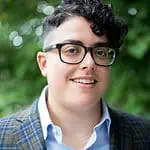Disability Justice & Access-Centered Pedagogy in the Pandemic
AWN hosted a fireside chat with Aimi Hamraie and Mimi Khúc about access-centered pedagogy and disability justice in February 2021.
Last spring, school went virtual for everyone from kindergarteners to grad students. Some college students had no safe place to go to. Parents and caregivers working in and outside the home have had to contend with competing and sometimes impossible demands on money, time, and energy. Some teachers, faculty, and staff have been pressured to return to in-person teaching in unsafe conditions. Many students have been craving in-person learning and community. Everyone has felt the demands to rush, and above all, to perform and achieve despite the collective trauma and mass death of the pandemic. And still the pandemic has hit disabled people at the margins of the margins the hardest, depriving us of resources, support, and care. This fireside chat between two leading scholar-activists will explore what access-centered pedagogy, rooted in disability justice, can offer us all.
Presenters
Aimi Hamraie

Aimi Hamraie is associate professor of Medicine, Health, & Society and American Studies at Vanderbilt University, where they direct the Critical Design Lab. Hamraie is author of Building Access: Universal Design and the Politics of Disability (2017). They are co-founder of the Nashville Disability Justice Collective and Nashville Mutual Aid Collective.
Mimi Khúc

Mimi Khúc is a writer, scholar, and teacher of things unwell and Scholar/Artist/Activist in Residence in Disability Studies at Georgetown University. She is the managing editor of The Asian American Literary Review and guest editor of Open in Emergency: A Special Issue on Asian American Mental Health. She is very slowly working on several book projects, including a manifesto on contingency in Asian American studies and essays on mental health, the arts, and the university. But mostly she spends her time baking, as access and care for herself and loved ones.
Communication Access Team
- Chante Frazier - ASL interpretation
- Linda Z. - CART captioning
